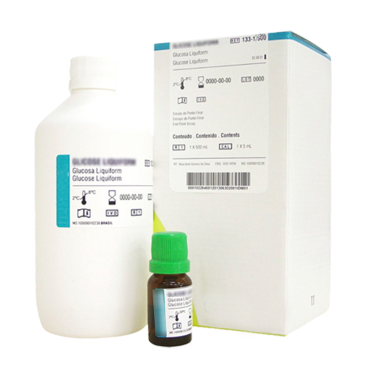Cromatest LDH Biochemistry Reagent Ready to Use – 100 Test
৳ 3,000৳ 3,500 (-14%)
In stock
Packaging Size: (2×50) ml
Origin: Spain
Brand : Cromatest / Linear
Packaging Type: Bottle
Test/Pack: 100Test
Method: UV enzymatic method KINETIC
Frequently Bought Together
-
Add to Package (৳ 3,000
৳ 3,500(-14%)) -
Add to Package (৳ 2,800
৳ 3,000) -
Total Price: ৳ 5,800
- This item: Cromatest LDH Biochemistry Reagent Ready to Use - 100 Test(৳ 3,000
৳ 3,500(-14%)) - Cromatest Glucose MR Reagent for Biochemistry Analyzer - 1000 Test(৳ 2,800
৳ 3,000)
Cromatest LDH Biochemistry Reagent
PRINCIPLE:
Lactate dehydrogenase (LD/LDH) catalyzes the reduction of pyruvate to lactate (P-L) in the presence of reduced nicotinamide adenine dinucleotide (NADH) at pH 7.5.
The reaction is monitored kinetically at 340 nm by the rate of decrease in absorbance resulting from the oxidation of NADH to NAD+ proportional to the activity of LD present in the sample.
REAGENT COMPOSITION:
R1: LDH substrate. TRIS buffer 100 mmol/L pH 7.5, pyruvate
2.75 mmol/L, sodium chloride 222 mmol/L.
R2: LDH coenzyme. NADH 1.55 mmol/L
STORAGE AND STABILITY: Store at 2-8ºC.The Reagents are stable until the expiry date stated on the label.
REAGENT PREPARATION:
Working reagent. Mix 4 mL of R1 + 1 mL of R2. Stable for 2 months at 2-8ºC. Protected from light.
Discard the reagent if presents an absorbance below 1.200 at 340 nm against distilled water or if it fails to recover the declared values of control sera.
SAMPLES:
Serum free of hemolysis separated from the cells as soon as possible after collection. The use of heparin and citrate as anticoagulants have been reported to falsely elevate LD activity.
Freezing results in loss of activity of the enzyme.

INTERFERENCES:
-Hemolysis results in the release of LD from red cells into the body fluid, giving falsely high
-Hyperbilirubinemia does not affect the LD
High concentrations of urea inhibit the enzyme
MATERIALS REQUIRED:
- Photometer or spectrophotometer with a thermostatted cell compartment set at 30/37ºC, capable to read at 340
- Stopwatch, strip-chart recorder or
- Cuvettes with 1-cm
- Pipettes to measure reagents and
- PROCEDURE:
- Preincubate working reagent, samples, and controls to reaction temperature 30/37ºC.
- Set the photometer to 0 absorbances with distilled
- Pipette into a cuvette:
Reaction temperature 30/37ºC Working reagent Sample or control 1.0 mL 20 mL - Mix gently by Insert cuvette into the cell holder and start stopwatch.
- Incubate for 30 seconds and record initial absorbance
- Repeat the absorbance readings exactly after 1, 2 and 3
- Calculate the difference between
CALCULATIONS:
U/L = DA/min x 8095
Samples with DA/min exceeding 0.150 at 340 nm should be diluted 1:10 with saline and assayed again. Multiply the results by 10.
If results are to be expressed as SI units apply: U/L x 0.01667 = mkat/L
REFERENCE VALUES1
Serum:
Temperature 37ºC 30ºC Adults 207-414 U/L (3.40-6.80 mKat/L)
140-280 U/L (2.30-4.70 mKat/L)
It is recommended that each laboratory establishes its own reference range.
QUALITY CONTROL
To ensure adequate quality control (QC), each run should include a set of controls (normal and abnormal) with assayed values handled as unknowns.
REF: BC600 HUMAN MULTISERA NORMAL Borderline level of LDH. Assayed.
REF: BC650 HUMAN MULTISERA ABNORMALElevated level of LDH. Assayed.
CLINICAL SIGNIFICANCE2,3
The enzyme activity found in circulation is a mixture of five isoenzymes. Each organ has a characteristic isoenzyme profile. Leakage of these isoenzymes from a diseased organ results in the elevation of total serum LD.
Increased levels become evident 8-12 hours after myocardial infarction reaching a maximum 4-5 days later. Elevated values in serum are also encountered in cases of pulmonary embolism and in about one third of patients with renal disease, specially those with pyelonephritis or tubular necrosis. In toxic hepatitis with jaundice, Hodking´s disease and abdominal and lung cancers elevations are specially high.
Moderate increases are also observed in cases of liver disease, megaloblastic and pernicious anemia and progressive muscular dystrophy. Decreases are not important clinically.
ANALYTICAL PERFORMANCE:
- Linearity :Up to 1200 U/L
- Precision:
U/L Within-run Between-run Mean 281 1.65 1130 281 430 980 SD 1.3 2.42 2.64 2.3 2.71 3.06 CV% 0.46 0.52 0.23 0.82 0.63 0.31 N 10 10 10 8 8 8 - Replicates: 10 for each level. Replicates: 8 for each level Instrument: CECIL CE 2001 for 4 days.
- Sensitivity. Using this reagent and method an DA/min of 00 read at 340 nm is equivalent to 10 U/L of LDH activity.
- Correlation. This assay (y) was compared with a similar commercial method (x). The results were:
N = 25 r = 0.997 y = 1.07x – 2.410
REFERENCES:
- Commission Enzymologie de la Societé Française de Biologie Ann. Biol. Clin. 40: 123-128 (1982).
- Young, S. Effects of Drugs on Clinical Laboratory Tests. 4 th Edition. AACC Press (1995).
- N.W. Clinical Guide to Laboratory Tests, 3rd Edition.
W.B. Saunders Co. Philadelphia, PA. (1995).
Brand
Chromatest
Linear
You must be logged in to post a review.








Reviews
There are no reviews yet.